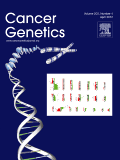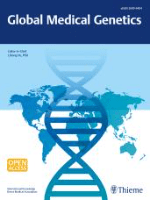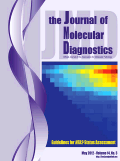
Cancer Genetics
Scope & Guideline
Advancing Cancer Research Through Genetic Insights
Introduction
Aims and Scopes
- Genetic Mechanisms of Cancer:
The journal emphasizes studies that elucidate the genetic alterations associated with various cancers, including mutations, copy number variations, and chromosomal rearrangements. - Clinical Applications of Genetic Testing:
Research published in the journal often explores the application of genetic testing for cancer risk assessment, diagnosis, and treatment decisions, including the use of targeted therapies and personalized medicine. - Biomarker Discovery and Validation:
The journal highlights the identification and validation of genetic and epigenetic biomarkers that can predict cancer progression, treatment response, and patient outcomes. - Molecular Pathology and Tumor Genomics:
A significant focus is placed on the integration of molecular pathology techniques with genomic sequencing to improve the understanding of tumor heterogeneity and therapeutic resistance. - Translational Research and Therapeutics:
The journal supports translational research that bridges laboratory findings with clinical practice, particularly studies that investigate novel therapeutic strategies and drug development.
Trending and Emerging
- Liquid Biopsies and ctDNA:
There is a growing emphasis on the use of liquid biopsies and circulating tumor DNA (ctDNA) as non-invasive tools for cancer detection, monitoring treatment response, and predicting relapse. - Genetic Profiling and Personalized Medicine:
Research focusing on comprehensive genetic profiling of tumors to inform personalized treatment strategies is on the rise, highlighting the shift towards tailored therapies based on individual genetic makeup. - Functional Genomics and Gene Editing:
Emerging methodologies such as CRISPR and other gene editing technologies are increasingly featured, showcasing their potential in understanding cancer biology and developing novel therapeutic approaches. - Long Non-Coding RNAs and Epigenetic Regulation:
The investigation of long non-coding RNAs and their role in cancer development and progression is gaining traction, reflecting a broader interest in epigenetic factors that influence gene expression in malignancies. - Integration of Multi-Omics Data:
There is a trend towards the integration of multi-omics approaches (genomics, transcriptomics, proteomics) to provide a more comprehensive understanding of cancer biology and treatment responses.
Declining or Waning
- Traditional Cytogenetics:
Research centered around traditional cytogenetic techniques such as karyotyping is appearing less frequently, as newer genomic technologies like next-generation sequencing (NGS) become more prevalent. - General Cancer Epidemiology:
There is a noticeable decline in studies focusing solely on cancer epidemiology without a genetic component, as the field increasingly prioritizes genetic and molecular factors in cancer research. - Basic Laboratory Research:
Papers focusing solely on basic laboratory techniques without direct applications to clinical practice or genetic implications are becoming less common, as the journal pivots toward more clinically relevant research. - Single Gene Studies:
Studies investigating the role of single genes in cancer without considering the broader context of genomic interactions and networks are waning, reflecting a trend towards more integrative genomic approaches.
Similar Journals

INTERNATIONAL JOURNAL OF HUMAN GENETICS
Illuminating Niche Topics in Genetic ResearchINTERNATIONAL JOURNAL OF HUMAN GENETICS is a distinguished publication dedicated to advancing knowledge in the fields of genetics and molecular biology. Published by KAMLA-RAJ ENTERPRISES, this journal explores critical developments and research findings from 2008 to 2016, though its coverage in Scopus has since been discontinued. With an ISSN of 0972-3757 and an E-ISSN of 2456-6330, the journal aimed to foster scholarly dialogue and serve as a resource for researchers, professionals, and students engaged in human genetics. While the journal holds a modest ranking in categories such as Biochemistry and Genetics, it remains a vital source for exploring niche topics within the realm of human genetics. Researchers interested in genetic screening, gene therapy, and clinical genetics will find valuable insights herein. Despite its pause in indexing, the journal continues to contribute to the academic discourse by disseminating critical research that bridges gaps in understanding human genetics.

Human Genomics
Advancing the Frontiers of Genomic ScienceHuman Genomics, published by BMC, is a leading open-access journal dedicated to advancing the field of genomics and its applications in health and disease. Since its inception in 2003, the journal has provided a vital platform for researchers to disseminate groundbreaking findings related to genetic research, contributing significantly to areas such as Drug Discovery, Genetics, Molecular Biology, and Molecular Medicine, as reflected in its Q1 and Q2 quartile rankings throughout 2023. With an ISSN of 1473-9542 and an E-ISSN of 1479-7364, Human Genomics not only delivers high-quality, peer-reviewed research but also ensures accessibility to a broader audience, empowering professionals, students, and academics to stay at the forefront of genomic science. Through its rigorous editorial standards and impactful publications, the journal fosters a collaborative environment for innovative research across the globe from its base in the United Kingdom. By promoting open access since its launch, Human Genomics continues to enhance the visibility and impact of genetic studies, making it an essential resource for anyone involved in the rapidly evolving field of human genomics.

Genetic Testing and Molecular Biomarkers
Unlocking Insights at the Intersection of Genetics and Medicine.Genetic Testing and Molecular Biomarkers, an esteemed journal published by MARY ANN LIEBERT, INC, serves as a pivotal platform for advancing the field of genetic research and its applications in medicine. Focused on the innovative intersections of genetics and biomarker discovery, this journal has consistently contributed meaningful insights since its inception in 2009, with its scope evolving through 2024. With an ISSN of 1945-0265 and an E-ISSN of 1945-0257, it offers both traditional and open access options to cater to a broad audience of researchers, professionals, and students. Despite its current classification in the Q4 and Q3 quartiles for Genetics (clinical) and Medicine (miscellaneous) respectively, the journal remains committed to publishing high-quality, peer-reviewed articles that push the boundaries of knowledge in the field. As the landscape of genomic medicine continues to expand, Genetic Testing and Molecular Biomarkers is positioned as a crucial resource for disseminating cutting-edge discoveries and fostering interdisciplinary collaboration.

Genetics Research
Exploring the Frontiers of Genetic DiscoveryGenetics Research, published by HINDAWI LTD, is a distinguished open access journal that has been at the forefront of genetic studies since its inception in 1960. With the transition to open access in 2019, this journal has expanded its accessibility, fostering knowledge dissemination across the global scientific community. Operating out of the United Kingdom, it provides a platform for innovative research in the fields of genetics and molecular biology, encompassing a broad range of topics that are highly relevant to medical sciences. As of 2023, it holds a Q4 classification in Genetics and a Q3 classification in miscellaneous Medicine, reflecting its ongoing commitment to scholarly excellence amidst shifting academic landscapes. While the journal's H-index remains unlisted, its indexed ranking within Scopus, with a rank of #325/328 in the Genetics category highlights the challenges ligated to its niche audience. Nevertheless, it serves as a crucial resource for researchers, professionals, and students eager to contribute to and stay informed on the latest genetic research trends and breakthroughs.

Familial Cancer
Empowering researchers with cutting-edge findings.Familial Cancer is a premier journal dedicated to advancing the understanding of hereditary cancer, published by Springer. With an ISSN of 1389-9600 and E-ISSN 1573-7292, this journal serves as an essential platform for researchers and clinicians focused on the genetic predispositions to cancer and the implications for patient care. Since its inception in 2001, Familial Cancer has built a strong reputation, being consistently ranked in the Q2 category across several key research areas including Cancer Research, Genetics, and Oncology. As of 2023, it holds significant Scopus rankings, reflecting its impactful contributions in the fields of Medicine and Genetics, with a focus on clinical applications. The journal does not currently offer Open Access, emphasizing the commitment to rigorous peer review and high-quality publications. It is vital for emerging researchers and seasoned professionals alike, providing insights into the hereditary aspects of cancer and fostering developments that can lead to better prevention and therapeutic strategies.

Human Gene
Advancing the Frontiers of Human GeneticsHuman Gene is an innovative open access journal published by ELSEVIER, dedicated to the ever-evolving field of genetics. Established in 2022, this journal serves as a vital resource for researchers, professionals, and students alike, aiming to facilitate the dissemination of groundbreaking research and advancements in both basic and clinical genetics. With an ISSN of 2773-0441, Human Gene focuses on providing a platform for high-quality studies that investigate genetic mechanisms, their implications in health and disease, and novel therapeutic strategies. The journal currently holds a Q4 ranking in both Genetics and Clinical Genetics categories, reflecting its emerging status within the scientific community, and strives to enhance its impact to better serve an engaged audience. With its base in Amsterdam, Netherlands, Human Gene is committed to making research accessible through its open access model, inviting contributions that advance our understanding of human genetics and foster collaboration across disciplines.

JCO Precision Oncology
Advancing Personalized Medicine for Better OutcomesJCO Precision Oncology, published by Lippincott Williams & Wilkins, is a leading journal in the field of cancer research and oncology, recognized for its high-impact contributions and innovative approaches to precision medicine. Since its inception in 2017, this journal has consistently ranked in the Q1 category in both Cancer Research and Oncology for 2023, reflecting its esteemed position within the academic community. With a rigorous peer-review process and a focus on disseminating cutting-edge research, JCO Precision Oncology serves as a vital platform for researchers, clinicians, and healthcare professionals aiming to enhance the understanding and treatment of cancer through individualized therapies. The journal's comprehensive scope includes studies on genetic profiling, biomarker research, and novel therapeutic strategies, making it an essential resource for anyone involved in cancer care and research. Explore further and join a community committed to advancing precision oncology and improving patient outcomes.

CHROMOSOME RESEARCH
Elevating the discourse in chromosomal research and genetics.CHROMOSOME RESEARCH is a prestigious academic journal dedicated to advancing the field of genetics, published by SPRINGER. Operative since 1993, this journal is widely recognized for its contributions to the understanding of chromosomal dynamics, genetic interactions, and molecular biology, maintaining a significant impact factor that places it in the Q2 category within its field as of 2023. Despite being a non-open access publication, CHROMOSOME RESEARCH provides essential insights and peer-reviewed articles that are invaluable to researchers, professionals, and students alike, with continual publication through the convergence years stretching towards 2024. Furthermore, with a Scopus rank of #187 out of 347 in the Genetics category, it resides in the 46th percentile, epitomizing its relevance and scholarly rigor within the scientific community. For those engaged in the intricate study of genetics and chromosomal studies, CHROMOSOME RESEARCH remains a crucial resource for disseminating pivotal research findings and facilitating academic discourse.

Global Medical Genetics
Fostering Collaboration in Genetic ResearchGlobal Medical Genetics is a premier open-access journal dedicated to advancing the field of medical genetics. Published by GEORG THIEME VERLAG KG, this journal has been providing a dynamic platform for disseminating cutting-edge research and clinical findings since its inception in 2020. With the ISSN 2699-9404, it serves as an essential resource for researchers, healthcare professionals, and students who seek to explore the complex interplay between genetics and medicine. The journal aims to foster collaboration and innovation in the genetics community, addressing a diverse range of topics from genetic disorders to the application of genomics in personalized medicine. By providing open access to its content, Global Medical Genetics enhances knowledge sharing and accelerates advancements in healthcare, making it a vital asset for anyone invested in the future of genetics.

JOURNAL OF MOLECULAR DIAGNOSTICS
Pioneering the future of pathology through molecular innovation.The Journal of Molecular Diagnostics is a premier publication in the fields of molecular medicine and pathology, published by Elsevier Science Inc. With an impressive impact factor and recognized as a Q1 journal in both Molecular Medicine and Pathology and Forensic Medicine, this journal is dedicated to advancing the understanding and application of molecular diagnostics in clinical practice. The journal features rigorous peer-reviewed research, comprehensive reviews, and cutting-edge methodologies that highlight novel diagnostic tests and biomarkers. Researchers, professionals, and students in the biomedical sciences are invited to explore its diverse array of articles and contribute to a growing body of knowledge critical for innovation in healthcare delivery. Located in the Netherlands, the journal has secure its position among the top-tier journals with its recent Scopus ranking of 20th out of 208 in Medicine Pathology and Forensic Medicine, reflecting a strong percentile ranking of 90th. With coverage spanning from 1999 to 2024, the Journal of Molecular Diagnostics remains a vital resource for anyone committed to the future of molecular research and diagnostics.